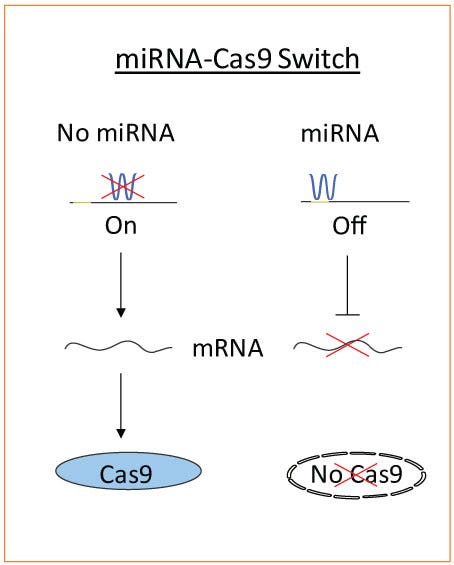
Cell Specific Snipping with miRNA-Cas9 Switches
October 2017
Recently, a group of Japanese researchers published work that incorporated the TriLink modified NTPs into custom Cas9 mRNA to optimize cell specific applications for CRISPR Cas9 gene editing.
Although DNA based gene editing has evolved rapidly, particularly for CAR-T therapeutics (Novartis’ Kymriah and Gilead’s Yescarta), one issue limiting its success in some applications is the ability to function in a cell-type specific manner. The Research Team opted for an RNA-based delivery system, which circumvents several of the safety issues associated with DNA-based systems, including genome integration.
"In order to regulate the endonuclease activity of Cas9, several methods have been reported, including optogenetic or small molecule/protein-inducible systems, a tissue-specific promoter system, and transcriptional regulatory circuits using split-Cas9. However, these reports have predominantly used DNA delivery approaches," the researchers reported.

The Team engineered an mRNA-based Cas9 switch that is modulated by cell-type specific microRNA (miRNA). Specifically, they introduced miRNA-complementary sequences into the 5’UTR of Cas9 mRNA (see Figure 1), hypothesizing that this could selectively control genome editing by sensing endogenous miRNA levels within a heterogeneous cell population.
The researchers were able to demonstrate that their miRNA-Cas9 switches efficiently and selectively responded to miRNA in HeLa cells. Using a different signature mRNA, they saw comparable results in human induced pluripotent stem cells (hiPSCs).
Impressively, they found that their system was also able to differentiate between hiPSCs and differentiated neuronal cells, which could have important therapeutic applications.
The researchers noted some areas for further optimization, such as reducing leaky expression, which may be mitigated by implementing Cas9 constructs that contain multiple miRNA switches.
The Team concluded that the system "should be applicable to other Cas9 variants (e.g. orthologs, engineered Cas9/dCas9 proteins) and other miRNAs in a plug-and-play manner." This functionality and ease of use could transform the therapeutic landscape for CRISPR-Cas9 technology.
Featured Products: 5-methylcytidine, pseudouridine, and anti-reverse cap analogue (ARCA). Check out the new TriLink proprietary ARCA alternative, CleanCap®, with up to 50% higher capping efficiencies resulting in more biologically active mRNA.
Have a question? Visit Ask An Expert.

